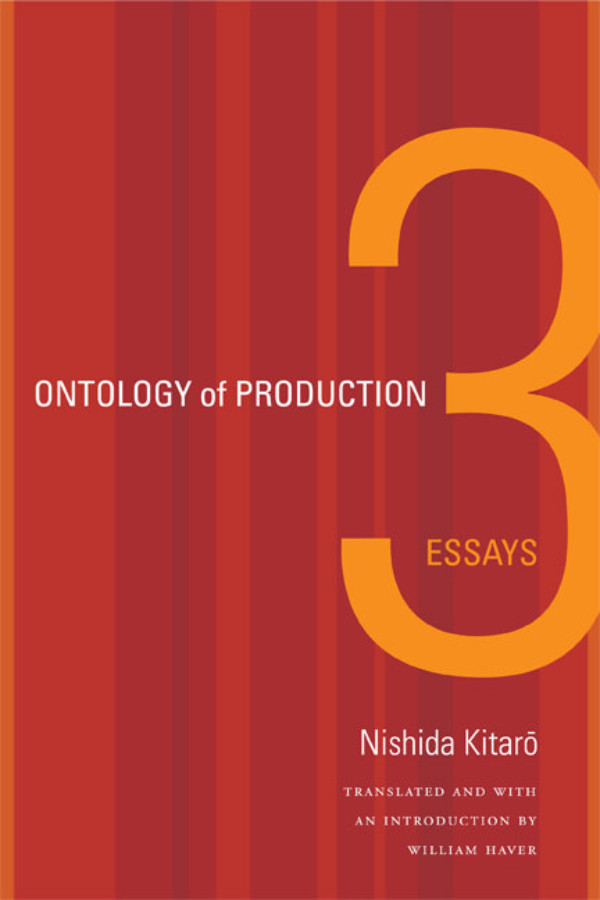Nishida Kitarō: Ontology of Production: Three Essays (2012)
Filed under book | Tags: · elan vital, marxism, ontology, philosophy, production

“Ontology of Production presents three essays by the influential Japanese philosopher Nishida Kitarō (1870–1945), translated for the first time into English by William Haver. While previous translations of his writings have framed Nishida within Asian or Oriental philosophical traditions, Haver’s introduction and approach to the texts rightly situate the work within Nishida’s own commitment to Western philosophy. In particular, Haver focuses on Nishida’s sustained and rigorous engagement with Marx’s conception of production.
Agreeing with Marx that ontology is production and production is ontology, Nishida in these three essays—”Expressive Activity” (1925), “The Standpoint of Active Intuition” (1935), and “Human Being” (1938)—addresses sense and reason, language and thought, intuition and appropriation, ultimately arguing that in this concept of production, ideality and materiality are neither mutually exclusive nor oppositional but, rather, coimmanent. Nishida’s forceful articulation of the radical nature of Marx’s theory of production is, Haver contends, particularly timely in today’s speculation-driven global economy. Nishida’s reading of Marx, which points to the inseparability of immaterial intellectual labor and material manual labor, provokes a reconsideration of Marxism’s utility for making sense of—and resisting—the logic of contemporary capitalism.”
Translated and with an Introduction by William Haver
Publisher Duke University Press, Durham and London, 2012
Asia-Pacific: Culture, Politics, and Society series
ISBN 0822351803, 9780822351801
208 pages
Review (David Baronov, Marx & Philosophy Review of Books)
Nishida Kitarō in Stanford Encyclopedia of Philosophy
PDF (updated on 2019-8-19)
Comments (3)Bernard Stiegler: Decadence of Industrial Democracies. Disbelief and Discredit, vol. 1 (2004/2011)
Filed under book | Tags: · biopolitics, capitalism, culture industry, democracy, desire, nihilism, philosophy, politics, production, singularity, technology

“Bernard Stiegler is one of the most original philosophers writing today about new technologies and their implications for social, political and personal life. Drawing on sources ranging from Plato and Marx to Freud, Heidegger and Derrida, he develops a highly original account of technology as grammatology, as a technics of writing that constitutes our experience of time, memory and desire, even of life itself. Society and our place within it are shaped by technical reproduction which can both expand and restrict the horizons and possibilities of human agency and experience.
In the three volumes of Disbelief and Discredit Stiegler argues that this process of technical reproduction has become dangerously divorced from its role in the constitution of human experience. Radically challenging the optimistic view of new technologies as facilitators of learning and progress, he argues new marketing techniques short-circuit thought and disenfranchise consumers, programming them to seek short-term gratification. These practices of ‘libidinal economics’ have profound consequences for nature of human desire and they underpin the social and psychological malaise of contemporary industrial society.
In this opening volume Stiegler argues that the industrial model implemented since the beginning of the twentieth century has become obsolete, leading capitalist democracies to an impasse. A sign of this impasse and of the decadence to which it leads is the banalization of consumers who become ensnared in a perpetual cycle of consumption. This is the new proletarianization of the technologically infused, hyper-industrial capitalism of today. It produces a society cut off from its past and its future, stultifying human development and turning democracy into a farce in which disbelief and discredit inevitably arise.”
First published in French as Mécréance et Discrédit: Tome 1, La décadence des démocraties industrielles, Galilée, 2004.
Translated by Daniel Ross and Suzanne Arnold
Publisher Polity, 2011
ISBN 0745648096, 9780745648095
200 pages
Review: Tom Bunyard (Radical Philosophy, 2012).
PDF (updated on 2020-8-7)
Comment (0)J. K. Gibson-Graham: A Postcapitalist Politics (2006)
Filed under book | Tags: · capitalism, economy, feminism, politics, postcapitalism, production, work

“Is there life after capitalism? In this creatively argued follow-up to their book The End of Capitalism (As We Knew It), J. K. Gibson-Graham offer already existing alternatives to a global capitalist order and outline strategies for building alternative economies.
A Postcapitalist Politics reveals a prolific landscape of economic diversity—one that is not exclusively or predominantly capitalist—and examines the challenges and successes of alternative economic interventions. Gibson-Graham bring together political economy, feminist poststructuralism, and economic activism to foreground the ethical decisions, as opposed to structural imperatives, that construct economic “development” pathways. Marshalling empirical evidence from local economic projects and action research in the United States, Australia, and Asia, they produce a distinctive political imaginary with three intersecting moments: a politics of language, of the subject, and of collective action.
In the face of an almost universal sense of surrender to capitalist globalization, this book demonstrates that postcapitalist subjects, economies, and communities can be fostered. The authors describe a politics of possibility that can build different economies in place and over space. They urge us to confront the forces that stand in the way of economic experimentation and to explore different ways of moving from theory to action.”
Publisher University of Minnesota Press, 2006
ISBN 0816648034, 9780816648030
316 pages
PDF (updated on 2025-5-3)
Comment (0)
